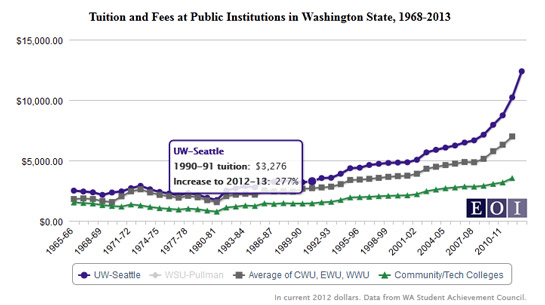Growing numbers of Washington’s high school graduates are losing their shot at the American Dream, as the long-term decline in state funding for higher education – exacerbated by deep budget cuts during and after the Great Recession – pushes tuition costs out of reach for middle- and low-income families.
Facing stagnant household incomes, students and their families must either take on a mountain of debt or shelve plans to attend college. Both paths limit their potential economic mobility, and Washington’s long-term economic productivity.
Meaningful employment in an occupation with good long-term prospects increasingly requires some form of postsecondary education – and the state’s economic growth is highly dependent on developing a workforce ready for 21st century jobs. But the higher wages and greater economic mobility once made possible by a college degree are being undermined as families and students go ever-deeper into debt in order to afford college. Conversely, students unwilling to take out loans effectively lose access to the increasing number of jobs that require higher education.

INTERACTIVE: Tuition costs and share of state versus student funding [via State of Working Washington]
Under Pay It Forward, students pay no upfront tuition fees to attend college. Instead, they pay a small percentage of their adjusted gross income (AGI) for a number of years after college: 0.75% per year of community college, or 1% per year of university, for 25 years. Payments are placed in a trust fund that covers the cost for future students to receive the same opportunity to attend college with no tuition fees – hence, “Pay It Forward”.
This system has several advantages: First, it entirely removes up-front tuition barriers to attending college. Second, after the transition to Pay It Forward is complete, the system is not only entirely self-financing – it also supports successive net increases in college enrollment, making higher education both more affordable and accessible for succeeding generations of students. Third, by linking payments to students’ ability to pay, Pay It Forward allows graduates to chose work based on their interests and skills, rather than solely on financial conditions. And finally, students retain access to federal financial aid to cover their cost of living, books, etc.
Pay It Forward could be implemented in one of several ways: statewide (using a large initial investment from a public or private source and subsequent allocations from the state budget or from a foundation); on pilot campuses (by converting existing state aid and accelerating inclusion of students); or in medical programs, covering the entire track of careers in the medical profession, from CNAs to RNs to PAs to MDs.
The trust fund itself can either be established at each institution or as a dedicated fund at the state level, and the exact percentage and number of years for repayment can vary depending on specific implementation, as well as type of degree (i.e. bachelor or associate).
While additional research and discussion with state policymakers, college administrators, students and other stakeholders is necessary, Pay It Forward has the potential to transform financing of higher education, making Washington’s colleges and universities truly affordable and accessible to all.
More To Read
May 19, 2025
A year of reflections, a path forward
Read EOI Executive Director's 2025 Changemaker Dinner speech
March 24, 2025
Remembering former Washington State House Speaker Frank Chopp
Rep. Chopp was Washington state’s longest-serving Speaker of the House
February 11, 2025
The rising cost of health care is unsustainable and out of control
We have solutions that put people over profits

